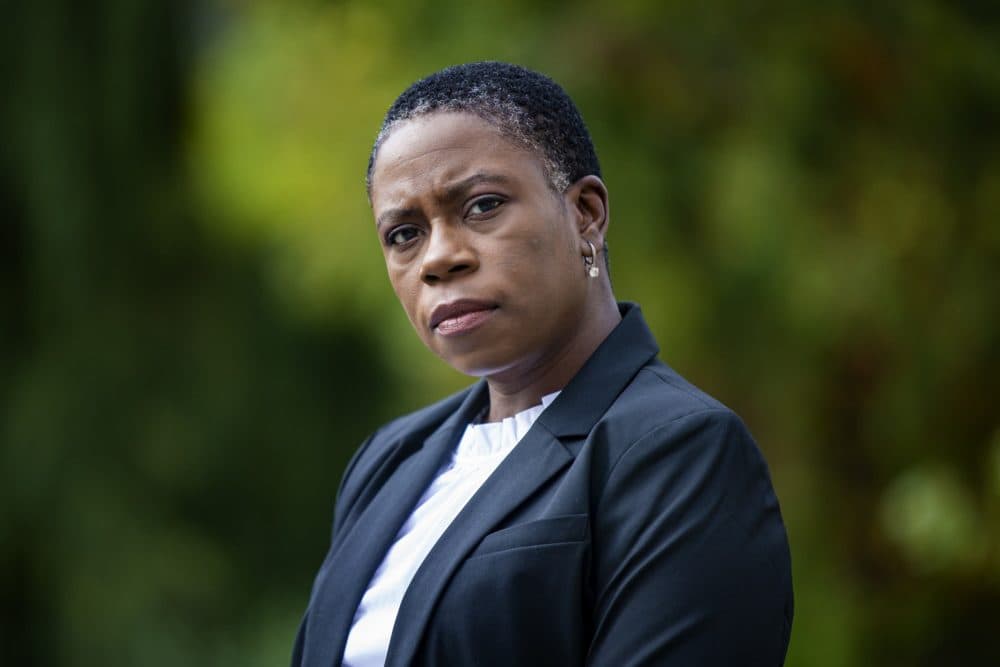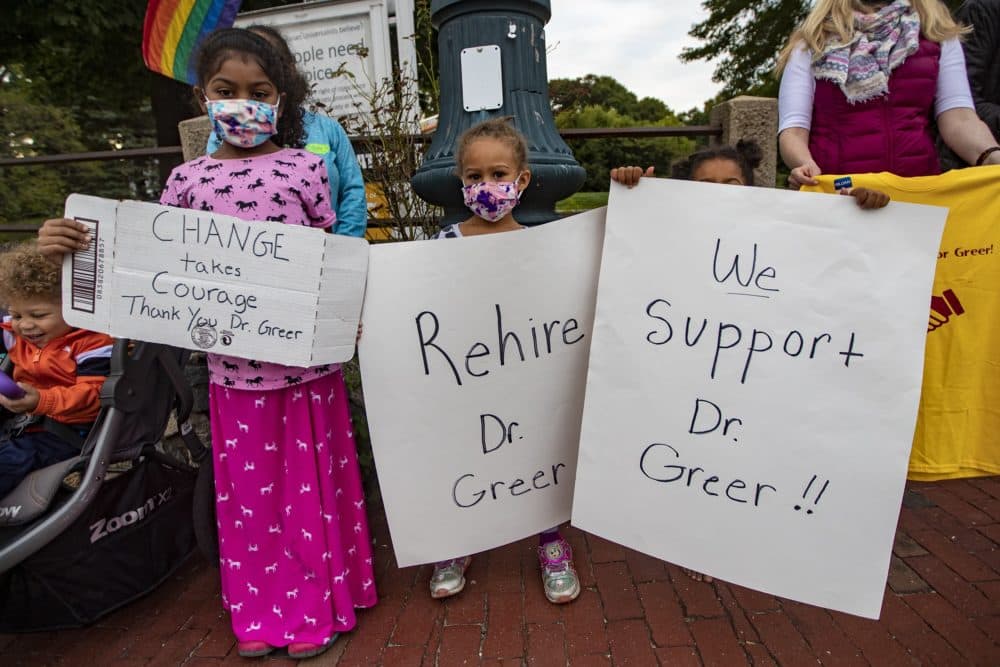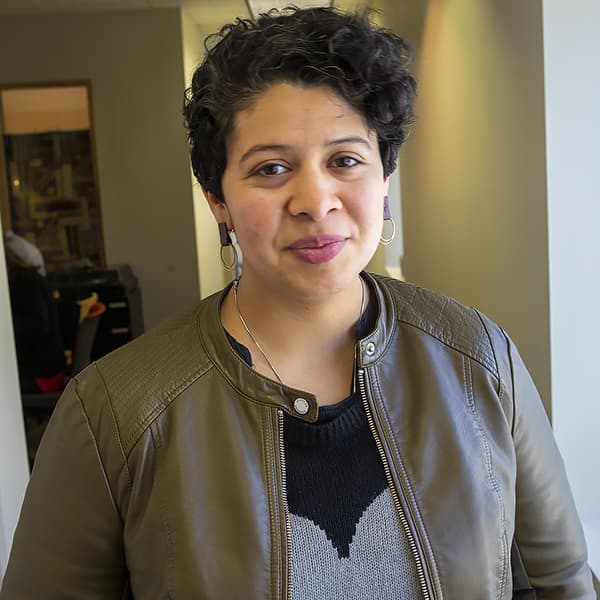Advertisement
Sharon School Committee Accused Of Racism After Ouster Of First Black Superintendent

On her first day as superintendent of Sharon Public Schools in fall of 2017, Victoria Greer remembers looking out at an auditorium of more than 600 district-wide employees. She was one of three Black staff members in the room, she recalled, the first Black superintendent in a town that prides itself on the quality of its schools and has a population that is steadily growing more diverse — but has few Black teachers.
“There’s me, a custodian at the high school, and there was a paraprofessional,” Greer said of that day. “That was it, as far as diversity.”
The Sharon School Committee unanimously hired Greer to lead the predominantly white and Asian district because of her expertise addressing equity issues. In July, the committee voted in executive session not to offer her a new contract after this year.
And last month, just three days before students returned to classrooms amid the ongoing coronavirus pandemic, the committee placed Greer on paid leave for the remainder of the school year. The school committee declined to offer an explanation for its decision.
Greer believes the committee retaliated against her for accusing members of racial discrimination and has filed a complaint with the Massachusetts Commission Against Discrimination, even as she worried doing so could hurt her career.
“This is not about me anymore. This is about fairness,” Greer said in an interview with WBUR. “This is about people knowing that they have a right to speak up when they have been wronged. This is about being an example to my students because I always encourage them if something is wrong, you need to let someone know.”
The school committee repeatedly denied requests via emails and phone calls for interviews with WBUR. In an email Tuesday, Julie Rowe, the committee's secretary wrote, "Thank you for your letter in which you offer the School Committee an opportunity to comment on the piece you are working on. At this time we are unable to comment further.”
What Greer said she experienced throughout her three-year tenure is a weariness that several superintendents of color across the commonwealth say they know all too well: the burden of trying to affect change while being the only Black or brown person in a sea of white faces.
Her ouster has gripped the community. Parents are demanding two committee members step down over the treatment of Greer and calling for the school committee members to confront not only their own privilege, but also the insidious nature of systemic racism. What happened in Sharon is an example of how even people with good intentions can deny the daily lived experiences of people of color; the divisiveness there is a microcosm of the national discourse around racial injustices.
The sole person of color on the committee, Fern Fergus, stepped down due to health concerns about a week after Greer was placed on leave and as masses took to the streets in anger that police officers would not face charges for the death of Breonna Taylor. Fergus defended Greer as she announced her own departure.
“I watched with great pain and anguish what was happening to Dr. Greer,” Fergus said close to midnight on Sept. 23. “And I can only say that it was like a slow-cooked lynching.”
Discrimination Claims
Greer said she was berated, yelled at and spoken to with condescension by members of the school committee — if they even addressed her directly at all — for a better part of three years, according to her complaint filed with the Massachusetts Commission Against Discrimination. The allegations vary: from repeated interruptions to repeated criticism of her communication and to insinuations that she was not articulate and/or did not know her place, as one performance review implied.
The complaint names two members of the committee: Heather Zelevinsky and current chair Judy Crosby. Several meetings over the last two years had to be suspended because the two women were “often so abusive and demeaning toward me, by shouting and yelling,” Greer said in the complaint.
“I cannot tell you the [number of times I was made to feel as if] I was inferior,” Greer said. “Like one night one of the members ... said, 'I just don't like the way you speak to your superiors.' ”
Hours of video footage of the meetings confirm Greer’s accounts, and in many cases, the episodes were witnessed by parents, teachers and former colleagues who watched the treatment of the superintendent during public meetings, either in person or via Zoom.
Through the committee, Zelevinsky and Crosby both declined to comment for this story. Crosby pledged during a public meeting that the committee will take part in listening sessions and an anti-racist training.
Greer said she was “blindsided” by the decision to place her on leave and not renew her contract.
“I was truly devastated. I've not done anything wrong except be Black and advocate for my civil rights,” Greer said, adding, “I haven't been treated as a human in many instances.”
Discrimination is not a new experience for Greer, she said. She’s a Black woman who grew up in the South. Yet she said that she never experienced the micromanaging and microaggressions that she did in Sharon.
“What happened to Dr. Greer is not unique,” Fergus said. “It's a story that is told, unfortunately, multiple times in different situations, in different parts of the country.”
The leader of the state’s superintendent association agreed about the larger systemic challenges for superintendents of color in Massachusetts.
“There is a huge disproportionality of educators of color, not just superintendents of color … relative to the students we serve,” said Tom Scott, executive director of the Massachusetts Association of Superintendents.
In Massachusetts, Scott said 12 of the 275 superintendents are people of color and 30% of the state's students are Black or Latinx. Scott said working in districts where there’s a majority white population can inhibit their ability to succeed.
“I was truly devastated. I've not done anything wrong except be Black and advocate for my civil rights.”
Victoria Greer
One of Greer’s career goals had been to rise to the level of superintendent.
“I traveled for a whole year to Chicago once a month to be under the tutelage of other sitting superintendents, so I understood what it was like,” Greer said. “There are so few African American women in the field, and there are so few of us that are able to remain in the field. Yet our presence is so important in education.”
A growing body of research shows having a Black teacher can increase educational outcomes for Black students. Like several other superintendents of color, Greer sought to make her school district better representative of the community.
Greer arrived in Sharon by way of Cambridge, where she previously served as an assistant superintendent. Members of the Sharon School Committee at the time lauded Greer’s experience working with students who have special needs as well as her passion for diversity, equity and inclusion.
It’s why she was drawn to Sharon. Black and Latinx students each make up about 5% of the district population. Nearly 30% are Asian.
“When I was interviewing for the position in Sharon, the community ... made it very clear that they were looking for someone who would be a transformational leader, that would not stick to the status quo, and would address issues around equity,” Greer said. “I told them, ‘I am all about equity and inclusion. That is my focus. That is what I do.' We're public education, I believe every child they introduce to school should have the same opportunity to be great.”
The school committee at the time seemed supportive of her goals.
Unequal Opportunities
A racial equity analysis completed in the summer of 2019 during Greer’s tenure found that Black students in Sharon are three times more likely to be disciplined by suspension or expulsion at least twice during their schooling, compared to their non-Black peers. Black students are over-referred to special education services in Sharon, while Asian students are under-referred for such services. In high school, the analysis found, Black students and students with disabilities do not have equal access to high level courses, and 56% of Black 10th graders reported feeling unsafe in their school environment.
“I'm hearing story after story — not just from parents — these are stories right out of the mouths of the students,” Greer said. “And I realized, of course, you don't go into a district and your first focus is one of the most difficult things that you do, which is equity. But the data and information was so glaring.”
In April of 2019, Black juniors and seniors from the Black Student Union at Sharon High School came before the school committee and presented their concerns about racial disparity with the hope that future classes wouldn’t have to deal with the racism they did.
“We can’t stay silent if we want things to change,” Jeremiah Bonnet, then a senior and president of the Black Student Union, said. “This is our community, but we don’t feel we’re a part ... we feel sectioned off.”
Yet Greer said when she brought these issues up, she was told that it wasn’t a priority. Zelevinsky said that “Black students are insignificant,” according to the complaint.
Greer’s evaluations during her three-year tenure in Sharon show all proficient marks. Jonathan Hitter, one of the committee members who hired her, noted in his most recent evaluation from July of this year, “the [committee’s] constant want to micro manage, criticize and allow personal agendas and personal biases to interfere with decision making is not an effective way to allow the superintendent to lead the district and do her job.”
Hitter did not return several calls from WBUR for comment.

The week that Greer was placed on leave, parents, teachers and students filled each corner of the town square. They had signs and face masks that said, “We’re here for Greer” and “Black Lives Matter.” All the parents told WBUR that this was a huge personal loss for their kids.
“My children have to carry the burden of being Black kids in that school every single day,” said Dru Ledbetter, a local mom and member of the town’s newly formed Diversity Equity Inclusion Committee. “I have to explain to my kid that his skin color does not make him dirty because a kid told him that. That kid learned that at home.”
On Facebook groups for the Sharon community, several parents told WBUR that residents were making racist remarks about Greer, claiming that she "pulled the race card."
“The town doesn't want the skeletons out of the closet,” Ledbetter said. “They want to keep their secrets in-house [but] these are our issues. Until we start to tackle them, we're not going to overcome, and we're not going to progress.”
The Work Ahead
Nearly a month after being placed on leave, Greer’s name is still brought up at every school committee meeting. She’s mentioned by her former staff who give her credit for Sharon schools reopening on time. She’s mentioned by parents upset by the committee's decision who make a point to remind members of Greer’s accomplishments, including a strategic plan centered on equity.
And she was mentioned by Fergus when she said she told the committee during an executive session, “You treated Dr. Greer like your [N-word] and that’s how you treat me.”
At a later public meeting, Zelevinsky said Fergus was unfit to serve because she used that racial slur. Crosby called Zelevinsky's comments to Fergus racist, appalling and inappropriate, and the committee censured Zelevinsky. Fergus abstained from the censure vote on Sept. 23, however, saying it would not solve the broader issues in the committee.
Two days ago, the Sharon Teacher’s Association separately voted no-confidence in Crosby, citing "Crosby’s handling of school reopening plans in light of COVID-19 and her overall management style that disregards input from educators and Sharon residents as reasons for voting no confidence in the chair," a statement from the STA said. Crosby, in a statement, called the vote "unfortunate" and a personal attack.
Without Fergus, once again the Sharon School Committee is completely white, with one open seat. If it weren’t for her health Fergus said she would have finished her term, which was set to expire in 2022. She never backs down from a fight unless she has a bigger one, she said.
“The town thought they were ready for something they weren't ready for,” Fergus said. “They thought they were ready for a Black woman to lead. They were not ready for that.”
Fergus said, however, this is much larger than the problems she faced on the school committee.
“It's something that the town, all of us collectively need to sit together and address,” Fergus said. “It's going to be a painful and slow process, and needs to be done with kid gloves. We need to make sure we have the right people in place. We can't let people co-opt it and use it for their glory or their redemption.”
Greer wants to continue the work she’s most passionate about in a town that’s ready to confront itself. It just might take time.
“My hope is that I have another opportunity to be a superintendent in a community that really is ready to address systemic issues of racism and social and cultural bias,” she said. “My hope is that by me basically putting myself out here and being extremely vulnerable, that it encourages others to be able to do the same.”
It’s moments like these that Greer seeks out her touchstone: to be "unapologetically fearless" — especially in the fight against inequity. And, perhaps, the community in Sharon can do the same.
Correction: An earlier version of this post gave the wrong date of the resignation of Fern Fergus. The post has been updated. We regret the error.
This article was originally published on October 07, 2020.
